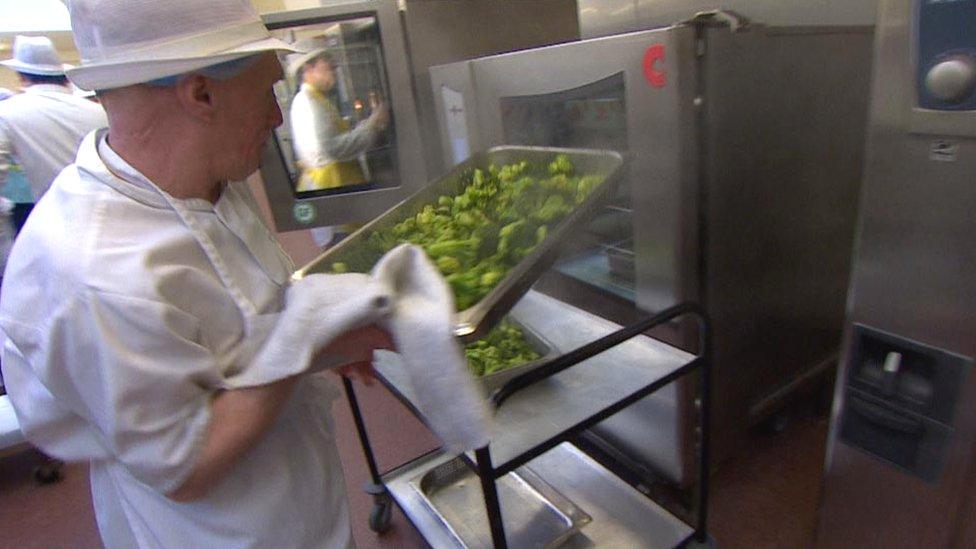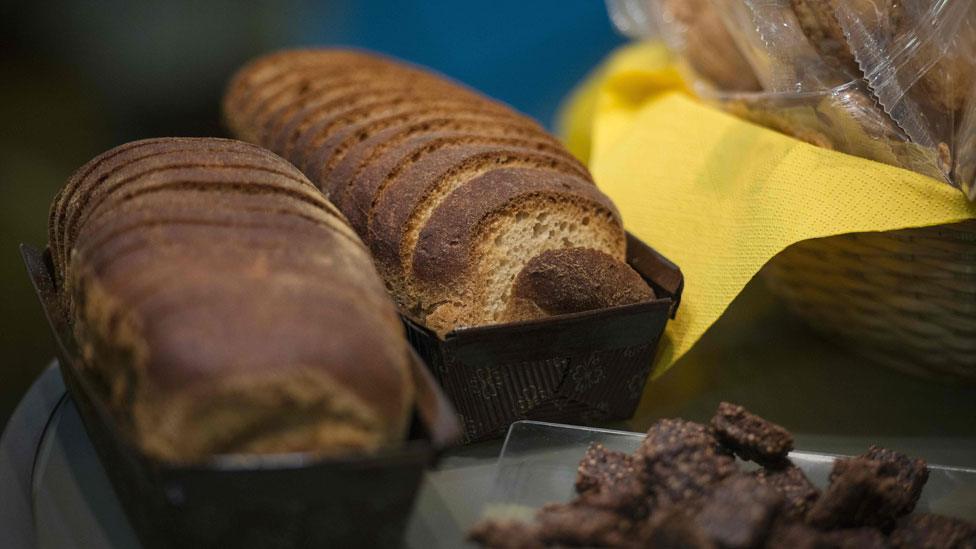Gluten-free food made at night in Aberdeen hospital to avoid contamination
- Published
Patients in Aberdeen can now eat gluten-free food made on site
Aberdeen Royal Infirmary's hospital kitchen has become the first in Scotland to be certified gluten free - by preparing food separately at night.
The hospital was previously buying in gluten-free meals.
Now the dishes are being made on site, but at night to avoid risk of contamination from certain ingredients being used during the day.
ARI is the first hospital kitchen in Scotland to achieve the Coeliac UK accreditation.
Coeliac disease is a common digestive condition where the small intestine becomes inflamed and unable to absorb nutrients.
One in 100 people in the UK have the disease.
It is caused by an adverse reaction to gluten, a protein found in wheat, barley and rye.
Gluten is found in food containing those cereals, such as pasta and many types of bread and beer.
NHS Grampian believes the new processes could be rolled out to other hospitals across the country.

Gluten-free food is now prepared at different times from other food without special requirements
Hundreds of meals have to be prepared every day at Aberdeen Royal Infirmary.
Catering manager Stuart Donald said: "Now we are making all of our gluten-free meals fresh on site, using local suppliers where possible with fresh ingredients.
"They are all made at a separate time of the day from the other meals being prepared, to ensure there's a total segregation of processes.
"Everything is being made at night. We have a separate chef who cooks these meals. The meals previously were bought in."
'Safe meal'
Asked what difference patients will see, Mr Donald said: "The first difference is rather than getting a frozen ready meal effectively for their lunch or their supper they're getting a fresh home-cooked meal like everyone else that takes the standard menu.
"The other big difference they can come in to hospital and be assured it's a safe meal for them to have. It can be quite worrying if you are coming into an unknown environment like a hospital, is your meal going to be safe?"
He said the in-house production also offered a cost-saving.

What is coeliac disease?
What is coeliac disease?
An auto-immune disease
If someone with the condition eats gluten - found in wheat, barley and rye - their immune system sees it as a threat and attacks it, which can lead to damage to the intestine walls
Foods such as pasta, breakfast cereal and many breads are an issue
It can seriously affect the body's ability to absorb nutrients in the long-term
Symptoms range from gut disturbances to headaches or skin problems, but some people show no symptoms at all
Treated by following a life-long gluten-free diet

There was an unannounced audit of the hospital just before Christmas, confirming the accreditation.
Coeliac UK chief executive officer Hilary Croft explained: "Being in hospital can make patients with coeliac disease feel vulnerable as they have to entrust their gluten free diet, which is the only treatment for their condition, to someone else.
"Coeliac UK only awards GF accreditation to hospitals that meet stringent and independently verified audit and training standards.
"We applaud Aberdeen Royal Infirmary's kitchen practices and processes regarding storage, labelling, preparation to avoid cross contamination and ensure the safe delivery of gluten free food by trained staff."
'Have confidence'
One patient in Aberdeen, Vera Lyall, said she had been eating gluten-free food for about 40 years.
"You learn quite quickly what you can and cannot eat," she explained.
She rated the gluten-free food made on site at the hospital as "pretty good", and added: "It certainly looks better, it's attractive, it's got a lot going for it I think.
"I have confidence, you've got to trust people."
- Published8 September 2016
